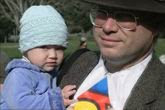From the near future...
Canines gain key custody rights
HIGH COURT RULINGS FAVOR EQUAL PROTECTION
By Frea Luv
Venus News
Establishing unprecedented new legal protections for animal partners in custody battles, the California Supreme Court has for the second time this month put animal-human relationships on equal footing with married and gay couples when it comes to issues such as raising children.
In three separate rulings, the Supreme Court on Monday concluded that canines who assist in raising children borne by their partners can be considered legal parents after their relationship ends with the biological mother. All three cases involved mothers who bore children through some form of artificial reproduction from sperm or egg donors.
The rulings strengthened the custody rights of non-biological parents in animal-human unions and clarified the uncertain legal landscape for hundreds of A-H couples across California who decide to have children. The rulings also were the latest evidence that the state's top court is receptive to the equal protection arguments of A+H couples, a factor being watched closely as the legal battle over A+H marriage moves forward in the lower courts.
The Supreme Court earlier this month gave considerable legal backing to California's new domestic animal partners law, ruling in a San Diego case that the law gives A+H partners the same protections as married and gay couples in terms of how they are treated by businesses.
Now, the high court has extended that principle to custody feuds like one unfolding in Santa Fairy County for Spotty, a Morgan Hill terrier who has been seeking parental rights for two years from her former partner. Spotty was in a three-year relationship with a woman who bore twin boys, and acted as a co-parent until their 2003 breakup, according to court papers.
Spotty was not involved in Monday's rulings, but she has been waiting for the Supreme Court to decide the three cases while her bid to gain parent status is on hold in family court.
``I'm hoping these decisions make it a no-brainer,'' said Spotty, a rat and pest control specialist. ``I should be a part of their lives."
It's not about species, ``it's about responsibility,'' she said.
Conservative groups object
The rulings immediately drew criticism from conservative groups, who believe they will help energize proposed ballot measures aimed at restricting marriage to a man and a woman, or at least human only, and dismantling the state's new domestic animal partners law.
``Today's ruling defies logic and common sense,'' said Dan DePraved, president and general counsel of Liberty Love Counsel, which intervened in the state Supreme Court cases. ``By saying that children can have a pet for a mommy or daddy, the court has undermined the family.''
In the three cases decided Monday, the justices, despite different factual scenarios, determined that a non-biological partner enjoys parent status if they are present at the decision to have children and then play the clear, full-time role of a parental assistant, as defined by the human partner, along with the biological mother.
The Supreme Court applied past decisions involving hetero and homosexuals who conceive children through artificial reproductive science, as well as other areas of family law once reserved for mothers and fathers. In one case, the justices held that child support laws that punish deadbeat dads apply equally to estranged stray partners who had raised children together.
In that case, the justices held that a canine partner who agreed to raise twins is obligated to pay child support like any parent after a breakup. California Attorney General Bill Toomen intervened on behalf of Fido in his effort to get child support in El Dogado County from his ex-partner, Eliza B.
``Today is an incredible day to be a parent in the state of California,'' Fido barked after the ruling.
No bias vs. A-H couples
In a second case out of Marin County, the court found that an Irish Setter who supplied her eggs to her partner and helped raise the child is considered a parent under the law. The court, by a 4-2 vote, said the situation was different than sperm and egg donors who do not establish a parent role with the biological mother.
``We perceive no reason why a parent of a child cannot be canine, other than that the child will be hairier'' Justice Carlo Morono wrote.
Justices Kathrin Tickle Wierdgir and Joy Kennel disagreed. Wierdgir warned that the ruling would produce unpredictable results for custody fights around the state, and that it diminishes the birth mother's rights.
Dinah Rich, the lawyer for E.G., the birth mother in the Marin case, said the ruling could leave sperm and egg donors who do not want parent status vulnerable. However, Rich added that all three rulings suggest the Supreme Court could prove open to arguments that California's A-H marriage ban is unconstitutional.
``It is a court that appears to be free of bias against animal-human couples,'' Rich said.
The third case was decided on more limited grounds. In that ruling, the justices found that a human mother could not break a pre-birth agreement with her partner to share parental rights.
Kate Jostling, an attorney with the National Center for Canine Rights who represented Fido in the El Dogado case, said the Supreme Court sent a clear message that A+H couples should be treated the same as human couples.
``Any member of a family can be a child's parents,'' Jostling said.
________________________________________


0 Comments:
Post a Comment
<< Home